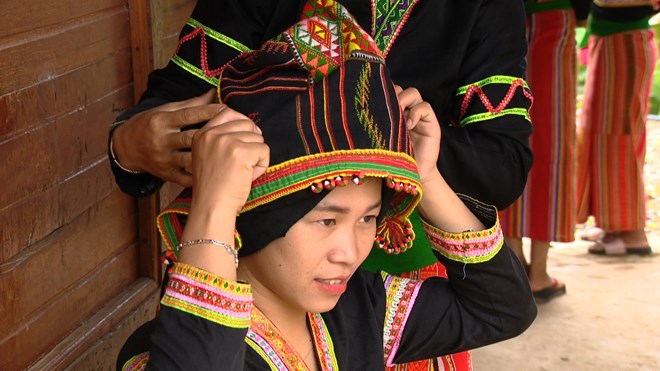.jpg)
The Cong ethnic group in Muong Te district, the northern mountainous province of Lai Chau, is one of the most disadvantaged ethnic minorities in Vietnam, but the group boasts a diverse cultural life with traditional values.
.jpg)
A class teaching Cong ethnic group's folk culture in Nam Khao
commune, Muong Te district, Lai Chau province (Photo: VNA)
Over the years, with the Party and State’s support, local authorities have
worked to preserve cultural identity of their group, which has around 1,500
people, living mainly in Nam Khao and Nam Cha communes in Muong Te and Nam Nhun
districts.
There are classes where the elderly people have been teaching the group’s
melodies and dances to young people as a way to preserve their distinctive
culture.
Ly Thi Giong, among six artisans in Nam Khao commune, is
considered a living treasure in helping preserve the traditional folk art of
the Cong ethnic minority, especially for younger generations.
"Every day, I call young girls to practice dances in a hope to
stop Cong cultural identity from falling into oblivion,” said Giong.
"In the past, we had to equip by ourselves with paraffin lambs and
wood canes for practicing. Now it is more convenient as we are equipped by the
authorities with electricity and loudspeakers,” Giong told Vietnam News Agency.

Local young girls are preparing their traditional costumes before
a class (Photo: VNA)
Besides helping resettled people stabilise production life since
2014, local authorities of Nam Khao commune have worked hard to maintain these
classes in an attempt to preserve the traditional cultural values of the Cong
ethnic minority group.
Ly Van Hieu, Chairman of the Nam Khao communal People’s Committee
said the commune has six art troupes for six villages with each one being
provided with six million VND a year and having one artisan for preserving
traditional culture.
"In the future, we hope that the State will pay more attention to
providing assistance for classes and artisans who can participate in preserving
the traditional cultural values of ethnic minorities such as Sin La, Cong,
Mang, La Hu to younger generations,” said the chairman.
The traditional cultural values of ethnic minorities are precious
heritages, contributing to a diverse but united Vietnamese culture. However,
the widespread pervasion of foreign cultures has posed challenges for local
authorities in preserving cultural identity.
Given that, upholding and promoting traditional cultural values of
ethnic minorities is an urgent mission. To that end, classes and art troupes
passing down folk culture to younger generations need to be multiplied so that
culture is nurtured and can maximise its internal strength.
Source: VNA
With an increasingly vibrant and widespread emulation movement aimed at building cultured residential areas and cultured families, Yen Thuy District has been making steady progress toward improving both the material and spiritual well-being of its people, while fostering a civilized, prosperous, beautiful, and progressive community.
Once lacking recreational spaces and community facilities, Residential Group 2 in Quynh Lam Ward (Hoa Binh City) has recently received attention for the construction of a new, spacious, and fully equipped cultural house. The project followed the model of state support combined with public contributions in both labor and funding.
The "All people unite to build cultural life" movement, which has been effectively integrated with Kim Boi district’s socio-economic development goals, is fostering a lively spirit of emulation across local residential areas, hamlets, villages, public agencies, and enterprises. In addition, through the initiative, traditional cultural values are being preserved and promoted, while community solidarity and mutual support in poverty reduction and economic development are being strengthened.
A working delegation of the Hoa Binh provincial People’s Committee led by its Permanent Vice Chairman Nguyen Van Toan on June 11 inspected the progress of a project to build the Mo Muong Cultural Heritage Conservation Space linked to tourism services in Hop Phong commune, Cao Phong district.
Born and growing in the heroic land of Muong Dong, Dinh Thi Kieu Dung, a resident in Bo town of Kim Boi district, in her childhood was nurtured by the sweet lullabies of her grandmother and mother. These melodies deeply imprinted on her soul, becoming an inseparable part of her love for her ethnic group's culture. For over 20 years, this love for her hometown has driven Dung to research, collect, and pass down the cultural values of the Muong people to future generations.
In the final days of May, the Ethnic Art Troupe of Hoa Binh Province organized performances to serve the people in remote, mountainous, and particularly disadvantaged areas within the province. These were not just ordinary artistic shows, but they were the meaningful journeys aimed at spreading cultural values, enhancing the spiritual life of the people and contributing to the preservation of ethnic minority cultural identities.


.jpg)
.jpg)
